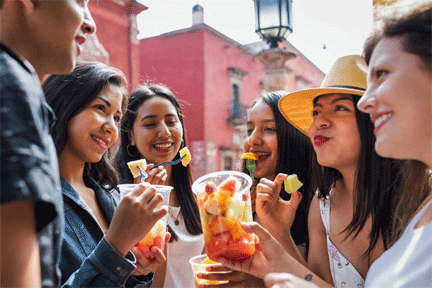I’m an American expat living in Mexico. Here are the biggest cultural differences between the 2 countries.
News Category: News and General Discussion
-
Published August 17, 2024
Story by insider@insider.com (Louisa Rogers)
When my husband and I decided to retire, we devised a plan. We wanted to rent out our home in California and visit the UNESCO World Heritage city of Guanajuato.
We planned on staying in the city for just six months, but 20 years later, we now live in Mexico as expats part time.
Even though my husband and I have been living in Mexico part time for two decades years, I’m still surprised at how different the culture is compared to the American culture I have lived in all my life.
The biggest cultural differences are always in the way we communicate.
People in Mexico tend to be more indirect
I found Americans to be very direct. In Mexico, however, if I speak bluntly and to the point, it can be misinterpreted as rude and offensive since it clashes with a more diplomatic communication style. The priority, as in other Latin countries, is to preserve harmony.To avoid conflict or confrontation, the Mexicans I met rarely say “no” directly but rather speak in a roundabout way to convey their message. If asked a “yes” or “no” question, they might meander around inconclusively before reaching a vague answer like: “Let me think about it.”
For example, in my yoga class, one member coordinates a monthly breakfast. A few weeks ago, I chuckled when I read the message she wrote to the group. She took 160 words to basically say, “We need to decide where to have breakfast this month.”
It’s different from my minimalist English style.
For some Mexicans, lateness is acceptable
As an American, I have noticed some Mexicans have a casual attitude toward time, which can be frustrating.Recently, for example, I had an appointment with the director of a nonprofit to discuss updating the agency’s newsletter. Before arriving at her office, I was already flustered because her directions had been ambiguous — at best — and in Guanajuato’s nonlinear streets, house numbers aren’t consecutive.
When I finally arrived, her staff told me she was out of the office and would be back ahorita, which means “soonish.”
Instead of recognizing that she was late only by my definition, not hers, I started to feel unimportant and ignored. When she showed up half an hour later, I felt less confident in my Spanish. While I’m fluent in the language, my conversational ease still fluctuates depending on different circumstances, and that day, it wasn’t as strong as usual. I left feeling very deflated.
My takeaway is not to take lateness personally in Mexico.
Cheeky jokes are the norm
The Mexicans I met like to tease each other, give friends cheesy nicknames, and make jokes about things that in the US would be inappropriate.For example, at a concert I attended, one of the musicians referred to another as gordito, meaning plump. I can’t imagine a performer joking about someone’s weight in the US — and never in front of an audience.
Personal space and alone time isn’t important to most Mexican people
In Guanajuato — the city in central Mexico where we live — there are many festivities with crowds, and as a gringa, I still find all the jostling and physical contact with strangers unsettling at times.A few years ago, our 25-year-old Spanish tutor told my British husband Barry that after her sister married, she would have a room to herself for the first time. He could think of nothing better.
“Isn’t that wonderful?” he said.
“Oh, no,” she said. “I’ll be lonely.”
Their respective reactions reflected very different cultural values.
Most Mexicans I meet appreciate simple courtesies
When we first bought our home, I didn’t realize how important courtesy is in Mexico. Thankfully, I have since softened and, in fact, have grown very fond of the gentle niceties many Mexicans use.If, for example, I’m asking directions or entering a shop, I know to first say Buenos días or Buenos tardes. Similarly, I always greet the driver and my fellow passengers when getting on a bus. When leaving a restaurant, I’m sure to say, as many Mexicans do, Buen provecho (meaning bon appetit) to the remaining diners.
Some courtesies make me laugh. If a person walks down the street in Mexico and sneezes, complete strangers from a block away will exclaim, Salud!, which means “good health” but also “cheers.”
After almost 20 years of living in Guanajuato, I’m still discovering quirky-to-me aspects of Mexican communication. The unexpected twists in the way Mexicans express themselves occasionally confuse me, but they are mostly a source of laughter and pleasure.
-


Leave a Reply